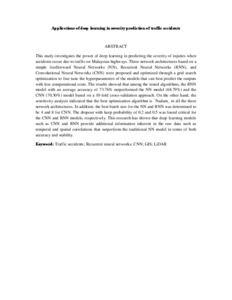Citation
Sameen, Maher Ibrahim and Pradhan, Biswajeet and Mohd Shafri, Helmi Zulhaidi and Hamid, Hussain
(2017)
Applications of deep learning in severity prediction of traffic accidents.
In: Global Civil Engineering Conference (GCEC 2017), 25-28 July 2017, Kuala Lumpur, Malaysia. (pp. 793-808).
Abstract
This study investigates the power of deep learning in predicting the severity of injuries when accidents occur due to traffic on Malaysian highways. Three network architectures based on a simple feedforward Neural Networks (NN), Recurrent Neural Networks (RNN), and Convolutional Neural Networks (CNN) were proposed and optimized through a grid search optimization to fine tune the hyperparameters of the models that can best predict the outputs with less computational costs. The results showed that among the tested algorithms, the RNN model with an average accuracy of 73.76% outperformed the NN model (68.79%) and the CNN (70.30%) model based on a 10-fold cross-validation approach. On the other hand, the sensitivity analysis indicated that the best optimization algorithm is “Nadam” in all the three network architectures. In addition, the best batch size for the NN and RNN was determined to be 4 and 8 for CNN. The dropout with keep probability of 0.2 and 0.5 was found critical for the CNN and RNN models, respectively. This research has shown that deep learning models such as CNN and RNN provide additional information inherent in the raw data such as temporal and spatial correlations that outperform the traditional NN model in terms of both accuracy and stability.
Download File
![[img]](http://psasir.upm.edu.my/64618/1.hassmallThumbnailVersion/Applications%20of%20deep%20learning%20in%20severity%20prediction%20of%20traffic%20accidents.pdf)  Preview |
|
Text (Abstract)
Applications of deep learning in severity prediction of traffic accidents.pdf
Download (47kB)
| Preview
|
|
Additional Metadata
Actions (login required)
 |
View Item |

